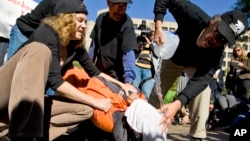People are divided about whether governments should torture people suspected of terrorism.
Torture involves severe physical or emotional pain to gain information from someone.
The Pew Research Center asked people in 38 nations if they believe torture is justified to gain information from suspected terrorists about future attacks. The average support for torture in the 38 countries was 40 percent.
Governments sometimes defend torture as a way of learning about a planned terrorist attack so they can take action to prevent it.
But a U.S. Senate Committee report said brutal questioning of suspects does not work. In 2014, the committee said torture was “not an effective means of acquiring intelligence or gaining cooperation” from terrorist suspects.
The most support for torture came from people in Uganda. Seventy eight percent of Ugandans polled by the Pew Research Center said they support torture against suspected terrorists.
Other countries with more than 58 percent support for torture were Lebanon, Israel, Kenya, Nigeria and the United States, Pew said.
All those nations have experienced terrorist attacks.
The lowest percentages of support for torture came from people in Argentina, Ukraine, Venezuela, Chile and Indonesia. Support in those five nations was 22 percent or less.
Richard Wike of the Pew Research Center reported recently on the research about support for torture. It was based on interviews that Pew did last year.
He said people who believe their own governments should use torture were more likely to support the United States' response to the 2001 terrorist attacks.
The deadly attacks on New York City and Washington D.C. led the George W. Bush administration to permit tougher treatment of suspected terrorists. It included keeping suspects awake for long hours, playing loud music and “waterboarding.”
Waterboarding is when water is poured on a cloth covering the face of a captive. It makes people feel they are drowning. Critics called the treatment torture, but the Bush administration denied this.
The treatment of terrorism suspects drew criticism. U.S. Senator John McCain, a Republican from Arizona, said torture is not effective and could subject U.S. troops to similar treatment.
President Barack Obama, who beat McCain in the 2008 presidential race, issued an order banning torture after his election win.
Businessman Donald Trump, a leading Republican presidential candidate, said he supports waterboarding to deal with Islamic State terrorists.
“We're like living in medieval times. If I have to do it and if it's up to me, I would absolutely bring back waterboarding," Trump told ABC.
I'm Christopher Jones-Cruise.
Bruce Alpert reported on this story for VOA Learning English. Kathleen Struck was the editor.
We want to hear from you. Write to us in the Comments Section or share your views on our Facebook Page.
______________________________________________________________
Words in This Story
means - n. way or method
acquiring - v. to come to have or to get something
tougher - adj. stronger
drew - v. led to
issued - v. to give something in an official way; released
medieval – adj. of or relating to the Middle Ages -- relating to the period of European history from about A.D. 500 to about 1500
absolutely – adv. in a complete way; not limited





